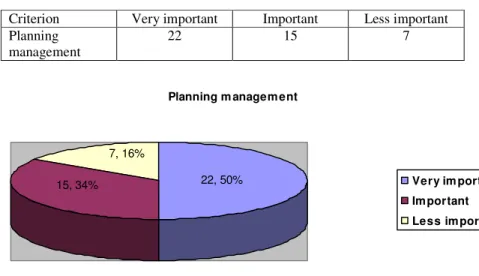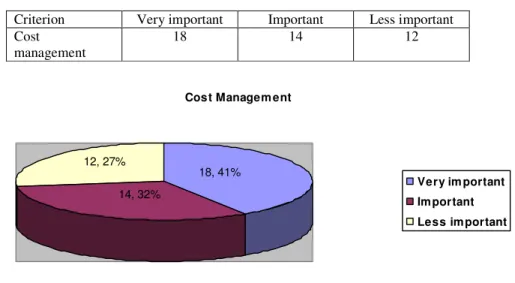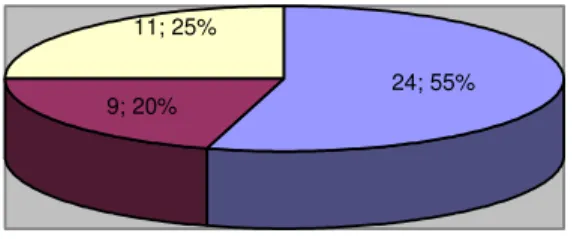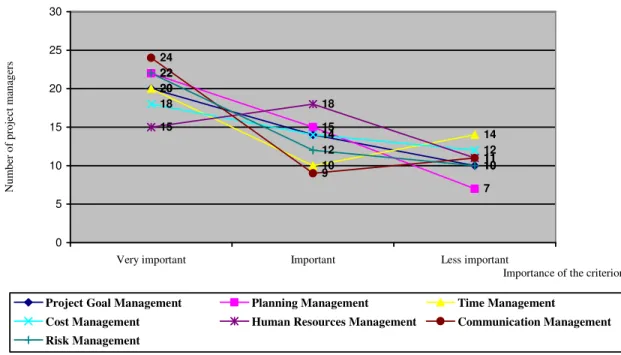THE PERFORMANCE OF A PROJECT MANAGER
Toma Cristian Marius, PhD, Economics Graduate School
„A1.I. Cuza” University Iasi, Faculty of Economics and Business Administration
Abstract: A project manager must do his/her best for the success of the project. Thus, he/she must fulfill a certain number of performance evaluation criteria which regard the unitary management of all project functions, including purpose, time, costs, quality, human resources, communication, risk and public procurement.
The purpose of this paper is to evaluate the performance of a given number of project managers on the basis of certain objective criteria, using a sample of 44 project managers included in the ”Excellence in Research” Program and of the National Research and Development Plan PN II 2007 – 2013.
For this study, out of the performance evaluation criteria for the project manager, there was noted the greatest interest presented by the communication management (54,54 %) and human resources management (40,91 %), whereas time management presented the least interest.
These results can be interpreted in the fact that an important issue for the successful evolution of the project is to facilitate communication within the project, with the client and other interested parties, as well as teamwork. Key words: performance, project manager, evaluation criteria
JEL Classification: M10 I. INTRODUCTION
Being a project manager entails consciously assuming the responsibility of a job which does not offer a stable and secure situation, on the contrary, a tense situation, due to the fact that this position implies undertaking managerial tasks in a changing environment in which, paradoxically, the results of the project should be successful. For this reason, there should be reached an equilibrium between the client’s requests and needs, as well as those of the project, organization and project team [3].
A project manager should do the best he can for the success of the project, considering that he is not the owner of a magical formula which could guarantee a peaceful life. A project manager should also know that the organization and the people he will work with might oppose, might generate and sustain a conflict that they might come up with very subtle actions and even sabotages, under certain circumstances [4]. It is obvious that all these negative outcomes could be opposed to a certain degree by a positive attitude. The main difference in comparison to a management position in a company which is considered stable, with a hierarchy which has been established for a long period of time, is that the position of project manager is temporary, for the duration of the project, after that the person goes back to his/her main position or he/she gets involved in other projects, with other teams [6].
This challenging position requires a number of skills, experience and knowledge which have been identified and grouped under the heading “project manager descriptors” and they are the following:
• General responsibilities of the project manager • Skills of the project manager
• Tasks of the project manager
• Credentials of the project management • Qualities of the project manager • Selection of the project manager • Roles of the project manager • Behaviour of the project manager
These competence descriptors should be permanently correlated to the project manager performance criteria so that the evaluation of the manager would be successful.
II. PURPOSE OF THE PAPER
Evaluate the performance of project managers on the basis of objective criteria.
III. MATERIALS AND METHOD
In order to evaluate the performance of the project manager we have studied a sample of 44 managers of the research projects undertaken at “Gr. T. Popa” University of Medicine and Pharmacy Iasi, projects which are part of the ”Excellence in Research” Program and of the National Research and Development Plan PN II 2007 – 2013. These managers were evaluated according to the following criteria:
Performance evaluation criteria [7]
1. Integrate project management functions including goal, time, costs, human resources, communication, risk and public procurement
2. Goal management
o Management of the project goal according to the agreed parameters
o Work together with the project team in order to define the purpose of the project and the estimated results of the project
o Supervise, monitor and control the accomplishment of the goal 3. Planning management
o Planning and design management, including design documentation
o Work together with the project team in order to develop the project and the necessary documents to accomplish the estimated results
o Revise project documents and papers and identify the problems which might influence project results
4. Time management
o Time management within the project
o Work together with the project team in order to establish the schedules and charts for the project activities
o Inform the clients about the contract provisions and send early notices regarding the impact of the project schedules and deadlines
o Meet the project deadlines
o Observe project postponements approved by the client, delays which lead to a longer duration of the project
o Monitor the progress of the project in comparison to the initial schedule 5. Cost management
o Management of project costs
o Work together with the team to establish the budget of the project
o Monitor project expenses in comparison to the expenses initially proposed in the budget
o Inform the clients about the contract provisions and send early notices regarding the impact on the budget of the project
o Variations in the budget approved by the client o Management of the financial activities in the project
o Monitor expenses during the project in comparison to the initially approved budget 6. Quality management
o Management of the project quality
o Work together with the team to develop the management plan for the project quality and quality management methods
o Monitor and control quality according to the requirements mentioned in the project o Identify and solve problems related to quality
o Contribute to the continuous quality improvement o Revise quality management at the end of the project 7. Human resources management
o Management of human resources within the project
o Work together with the project team in order to develop the staff structure and to establish the necessary human resources in the project
o Management of stakeholder groups interested in the project o Solve conflicts
o Encourage and support skills development for the project team 8. Communication management
o Management of communication within the project
o Facilitate communication within the project, with the client and other parties interested in the project
o Deliver the approved reports from the project 9. Risk management
o Management of risks within the project
o Work together with the project team in order to identify risks and develop the risk management strategies
o Monitor risk during the project 10. Procurement management
o Management of procurement within the project
o Work together with the team in order to plan and manage procurement in the project o Elaborate the necessary documents for the purchase contracts within the project o Select contract parties with adequate procedures
11. Environmental management
o Management of the project environment
o Work together with the team to identify the environment problems and develop environmental management strategies
o Monitor and control environment
o Identify and solve environmental problems
IV. RESULTS AND DISCUSSIONS
The first criterion to be taken into consideration in order to evaluate the performance of the project manager was the management of the project goal.
Table 1 presents the answers given by the respondents regarding the management of the project goal:
Criterion Very important Important Less important
Project goal management
20 14 10
Project Goal Managem ent
14, 32% 20, 45% 10, 23% Very im portant Im portant Less im portant
Table 2 presents the answers of the respondents regarding planning management:
Criterion Very important Important Less important Planning
management
22 15 7
Planning m anagem ent
15, 34% 22, 50%
7, 16%
Very im portant Im portant Less im portant
Table 3 presents the answers of the respondents regarding time management within the project:
Criterion Very important Important Less important Time
management
Tim e Managem ent 10, 23% 20, 45% 14, 32% Very im portant Im portant Less im portant
Table 4 presents the answers of the respondents regarding cost management within the project:
Criterion Very important Important Less important Cost
management
18 14 12
Cost Managem ent
14, 32% 18, 41% 12, 27% Very im portant Im portant Less im portant
Table 5 presents the answers of the respondents regarding human resources management within the project:
Criterion Very important Important Less important Human resources
management
15 18 11
Hum an Resources Managem ent
18, 41% 15, 34% 11, 25% Very im portant Im portant Less im portant
Table 6 presents the answers of the respondents regarding communication management within the project:
Criterion Very important Important Less important Communication
management
Communication Management 9; 20% 24; 55% 11; 25% Very important Important Less important
Table 7 presents the answers of the respondents regarding risk management within the project:
Criterion Very important Important Less important Risk Management 22 12 10 Risk Management 12; 27% 22; 50% 10; 23% Very important Important Less important
Figure 1 Evaluation of the project manager performance 20 14 10 22 15 7 20 10 14 18 14 12 15 18 11 24 9 11 22 12 10 0 5 10 15 20 25 30
Very important Important Less important
Importance of the criterion
N u m b er o f p ro je ct m an ag er s
Project Goal Management Planning Management Time Management
Cost Management Human Resources Management Communication Management
Risk Management
Most of the evaluated managers considered that communication management is the most important criterion (54,54 %, namely 24 subjects) (Figure 1).
Human resources management was also considered to be important (40,91 %, namely 18 subjects) (Figure 1). Time management presented the least interest among the respondents (31,82 %, namely 14 subjects) (Figure 1).
V. CONCLUSIONS
Fulfilling the task of project manager requires a certain number of skills, experience and knowledge which will help him/her to accomplish the proposed results, regardless of the environment conditions of the project.
These qualities should be in agreement with the performance criteria for the project manager all the time so that his/her evaluation could be successful.
For this study, among the evaluation criteria for the performance of the project manager we noticed that the greatest interest was arisen by communication management (54,54 %) and human resources management (40,91 %) and time management presented the least interest (31,82 %).
These results lead us to the conclusion that an important aspect in the successful completion of the project is represented by a simple and efficient communication within the project, with the client and other interested parties, but also by the teamwork.
VI. REFERENCES
1. Armstrong M, Baron A, Managing performance: performance management in action, London: Chartered Institute of Personnel and Development, 2005.
2. Armstrong M, Performance Management. Key Strategies and Practical Guidelines, 3rd ed., Ed. Kogan Page, USA, 2006.
3. Ciobanu MR, Project Management, Ed. Politehnium, Iasi, 2008.
4. Isoc D, Project Management Research, Ed. Risoprint, Cluj Napoca, 2007. 5. Levinson M, Six Attributes of Successful Project Managers, CXO Media Inc, 2009.
6. Nedelcu D., Pruteanu V, Project Management, Editura Politehnium, Iasi, 2005.
7. New South Wales Goverment, Performance management - Procurement Practice Guide, Australia, 2008 8. Oprea D., Project Management, Ed. Sedcom Libris, Iasi, 2001.



